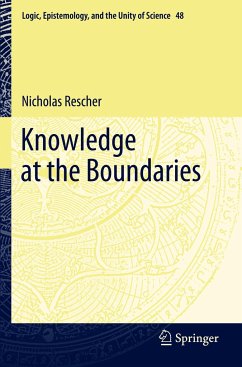
Knowledge at the Boundaries
Versandkostenfrei!
Versandfertig in 6-10 Tagen
83,99 €
inkl. MwSt.
Weitere Ausgaben:

PAYBACK Punkte
42 °P sammeln!
The book offers a reflection on the nature, scope, and limits of knowledge that have been at the focus of the author's work over decades. The essays collected in this volume expound and extend these efforts in exploring the outer fringes of understanding: the outer boundaries of conceivability, the limits of cognition, and the ramifications of ineffability and paradox. They join in exploring the lay of the land at the boundaries of knowledge.The first chapters address basic facts regarding the conceptualization of knowledge. This is followed by a study on how to deal with problems relating to ...
The book offers a reflection on the nature, scope, and limits of knowledge that have been at the focus of the author's work over decades. The essays collected in this volume expound and extend these efforts in exploring the outer fringes of understanding: the outer boundaries of conceivability, the limits of cognition, and the ramifications of ineffability and paradox. They join in exploring the lay of the land at the boundaries of knowledge.
The first chapters address basic facts regarding the conceptualization of knowledge. This is followed by a study on how to deal with problems relating to the affirmation and considerations of truth. The final chapters scrutinize the limits of demonstration and the inherent impossibility of realizing an ideal systematization of our knowledge of totalities. The book affords novel perspectives regarding the thought of a widely appreciated philosopher. It is an original work aimed for readers interested in the theory of knowledge and philosophy of cognition.
The first chapters address basic facts regarding the conceptualization of knowledge. This is followed by a study on how to deal with problems relating to the affirmation and considerations of truth. The final chapters scrutinize the limits of demonstration and the inherent impossibility of realizing an ideal systematization of our knowledge of totalities. The book affords novel perspectives regarding the thought of a widely appreciated philosopher. It is an original work aimed for readers interested in the theory of knowledge and philosophy of cognition.














